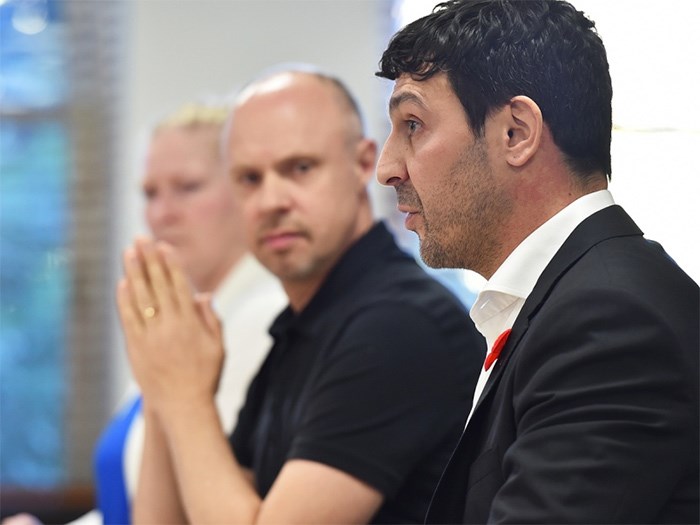 Beedie LivingвҖҷs Houtan Rafii (right) issued a pointed statement Tuesday directed at the two members of the cityвҖҷs development permit board who rejected the developerвҖҷs condo proposal for Chinatown. Photo Dan Toulgoet
Beedie LivingвҖҷs Houtan Rafii (right) issued a pointed statement Tuesday directed at the two members of the cityвҖҷs development permit board who rejected the developerвҖҷs condo proposal for Chinatown. Photo Dan Toulgoet
The development company whose proposal for a 111-unit condo building in Chinatown was has issued a brief but pointed statement aimed at the cityвҖҷs director of planning and chief engineer.
Houtan Rafii, the executive vice-president of Beedie Living, didnвҖҷt name Gil Kelley or Jerry Dobrovolny вҖ” the two members of the board who rejected the proposal at 105 Keefer St. вҖ” but referred to them as вҖңselect membersвҖқ who ignored recommendations from planning staff and others.
вҖңWe are extremely disappointed that the institutions mandated to provide regulatory and policy framework вҖ” the City of В鶹ҙ«ГҪУі»ӯplanning staff and the council-endorsed and appointed urban design panel and development permit board advisory panel вҖ” have been undermined and their unanimous support for 105 Keefer ignored by select members of the development permit board,вҖқ Rafii said Tuesday following the boardвҖҷs 2-1 decision Monday. вҖңLike many people, we are uncertain what this unprecedented decision will mean for these civic institutions.вҖқ
RafiiвҖҷs statement was issued a few hours after the Urban Development InstituteвҖҷs Anne McMullin issued a similarly worded statement saying her organization was disappointed and surprised by the development permit boardвҖҷs decision. McMullin, who is president and CEO of the institute, also used the word вҖңunderminedвҖқ to describe the decision.
She pointed out Beedie revised its proposal for 105 Keefer St. five times over four years. Like Rafii, she noted the proposals received the support of city staff and the urban design panel, and met existing zoning regulations and conformed to the official community plan for Chinatown.
вҖңThis is the first time since 2006 that the development permit board has rejected an application,вҖқ said McMullin, suggesting the boardвҖҷs decision creates вҖңsignificant uncertaintyвҖқ in the development industry. вҖңWe, the industry, see no policy reason for why this was rejected.вҖқ
Added McMullin: вҖңOur members, and the thousands of individuals represented in all facets of development and building, are concerned this decision undermines the integrity and reliability of the cityвҖҷs rigorous planning regime, and puts into question future projects, not only in Chinatown, but across the city. At a time when housing supply in market, rental and affordable homes has reached historic lows, this project denial sends a negative chill throughout the industry.вҖқ
BeedieвҖҷs 12-storey version of its proposal in June. That proposal went before council because it required a rezoning and public hearing. That was triggered by Beedie requesting the building be 118 feet tall. The revised version that was rejected Monday by the board was reduced to nine storeys and 90 feet tall, and did not require a rezoning or public hearing.
Paul Mochrie, the cityвҖҷs deputy manager, cast the only vote in support of BeedieвҖҷs proposal, which called for 111 condos in a nine-storey building on a piece of property in front of the Chinatown Memorial Plaza and across the street from the Dr. Sun Yat-Sen Garden.
Mochrie said the proposal met zoning regulations for Chinatown.
вҖңAs weвҖҷve heard, the use and the height of the building are outright entitlements [of the developerвҖҷs application],вҖқ said Mochrie, noting the proposal fell within the 90-feet height restriction for the area and met the test of city planners, the urban design panel and the boardвҖҷs advisory panel.
вҖңThis board, in my view, has no legal scope to deny the development permit based on either of those dimensions of the application. Exterior design is the only issue properly before the board, and I think thatвҖҷs a really critical point.вҖқ
Kelley and Dobrovolny cited concerns about the buildingвҖҷs design and exterior as primary reasons for rejecting the proposal. But both of them noted the hundreds of people who spoke against the proposal at public hearings in May and June, and at the board last week.


